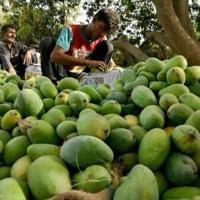Pakistan’s mangoes are usually a source of national pride and important income for farmers, but they are facing challenges due to climate change causing parasites and extreme weather that are ruining this season’s crop.
Farmer Muhammad Yusuf, with a white and orange scarf to shield him from the heat, expressed his concerns about the unpredictable weather.
An unusually long winter followed by the wettest April in decades, and now a scorching heatwave with temperatures reaching up to 52 degrees Celsius (126 degrees Fahrenheit) has affected the mango crop.
Yusuf, who has been growing mangoes for half his life, noted that buds didn’t flower on time and many were infected with the black hopper parasite.
Over 60 years old now, Yusuf blamed climate change for the havoc in his village of Tando Allahyar, northeast of Karachi.
Pakistan is a major mango producer globally, with agriculture contributing significantly to its GDP.
In Tando Ghulam Ali, Arsalan, who manages a large mango orchard, reported production losses due to the damage from pests.
Exports will be impacted as the mangoes are ripening unevenly, affecting their quality.
Other farmers in Sindh and Punjab provinces have also noticed increased spending on pesticides to combat the rise in parasites and pests affecting their crops.
The decline in crop yields has been ongoing for years, with losses totaling up to 50% in some regions compared to the previous year.
The reduced harvest will affect the country’s economy and its plans for exports, potentially leading to a significant income loss.
Farmers like Mashooq Ali in Tando Ghulam Ali are worried about the financial strain on their families and are urging the government to provide support during this challenging season.





